With the Federal Election fast approaching, Lightspeed GMI took a look at the outlook and viewpoints of Australian’s ahead of voting this year…because everyone has an opinion on the topic and everyone wants a finger on the pulse of which way this might swing.
Starting with the fundamental in any political study, we asked panellists which party they intend to elect. Labor was the clear front runner with 45% stating this is where they would be putting their vote. This was followed, not surprisingly, by the Liberal Party/ Coalition at 30%. 13% suggested their vote would fall outside of any of the major parties.There has been much talk in the press around confusion on the change in the voting process this year but the study found coming to 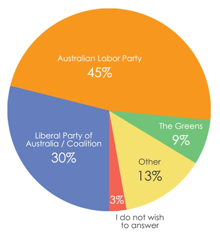 a decision was primarily unchanged for voters, with 46% saying it was about the same and 21% easier than last election vs 28% harder.
a decision was primarily unchanged for voters, with 46% saying it was about the same and 21% easier than last election vs 28% harder.
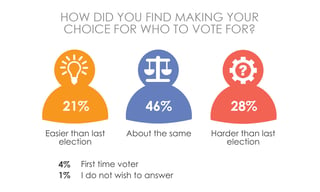
An area that stood out was the gender divide in being politically engaged. 62% males vs 47% females report themselves as interested in Australian politics and 58% males claim to have a thorough understanding of each political parties platform, whereas this is only 38% for females. More telling was that in terms of regularly reading, watching or listening to news regarding Australian politics, there was less of a gap at 68% agreement from males vs 58% from females. 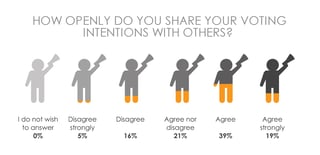
We delved a little deeper and found that the majority of Australians openly share their voting intentions (58%). In light of the gender question raised in earlier differences we broke this down further. 53% females share their intentions in comparison to 63% males. So, maybe being slightly less forthcoming is why females report as less engaged. Then again, maybe it is an accurate depiction of less confidence in the vote they will make. Lack of confidence in the two major parties came across as quite a major theme from both genders in an open ended question that followed up whether the choice was easier or harder than the choices available at last election:
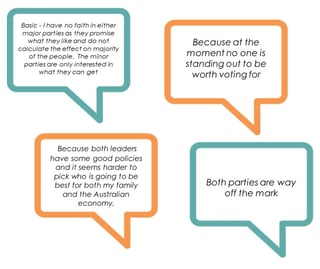
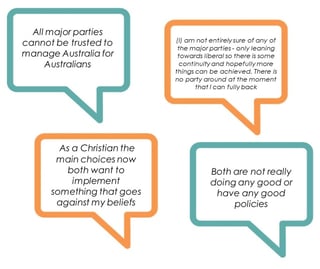
The role of the media in the upcoming election provided some interesting results; we found TV to be the most prevalent of sources at 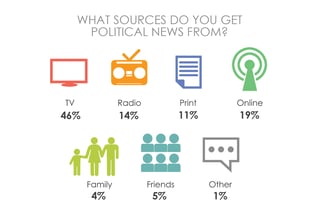 46% but were surprised to see the gap between TV and other sources.
46% but were surprised to see the gap between TV and other sources.
We were curious to understand voter’s agreement with the three major parties stance on key policy issues and their ability to identify each party’s policy stance. We looked at 10 policy areas and where the three main parties, (Coalition, Labor and the Greens) stood on these issues and asked participants first to tell us how much they agreed with each parties stance (without revealing the party) and then asked them to identify what party aligned with each stance.
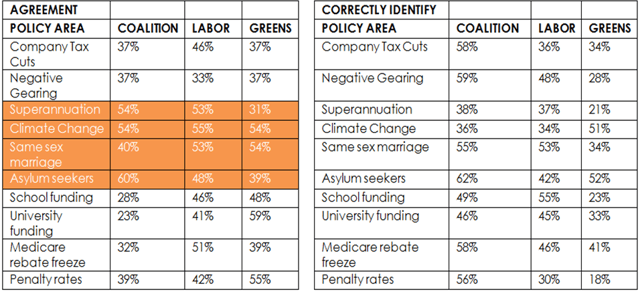
We think this tells an interesting story that warrants further investigation – there does not appear to be a strong level of agreement in any particular issue above with the below issues being the only ones that a majority shared an agreement on:
- Superannuation
- Climate change
- Same sex marriage
- Asylum seekers
Some of the level of agreement on these and other issues show confusion as to the difference of policy stance, perhaps indicating the cross-over of party interests; this is certainly a theme that came up in the open ended responses shown above.
The voter’s ability to identify party policy stance is also of interest with numbers not showing any overwhelming understanding of the major parties stance on these issues. Of the three major parties the Coalition had the highest percentage of policy recognition. Could this be because the party line has not been clearly communicated to the voting public or could the medium as the messenger play a part in the apparent obfuscation of the key messages?
Given that our election falls just nine days after the Brexit Referendum, we ran a further study to see if the earth-shaking result across the other side of the globe had an impact. This is where we return to some clear uncertainty in Australians, with 34.4% unsure if Britain leaving the EU was the wrong or right decision and 33.4% as it being the wrong decision. Only 21.9% believe it was the right decision, with 10.3% not caring or knowing about the matter.
Brexit has caused the question of Australia separating from the UK and becoming a Republic back to the forefront and here too we see uncertainty:
- 33% said they would support a decision to separate from the UK and become a Republic
- 33% said they would not support such a move
- 30% said they were undecided
This leaves potential for a volatile swing either way should a referendum similar to that held in the UK recently be repeated in Australia and hints at a repeat of the same divide seen in the UK.
In this follow up study we presented voters with a mix of the political issues stated earlier, some new ones and left room for them to suggest their own concerns:
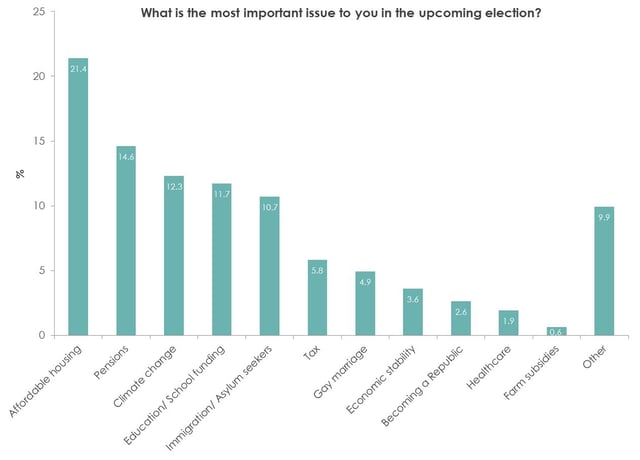
Affordable housing was central, with 21.4% of voters listing this as the most important issue, this was joined in the top three by concern about the Pension (14.6%) and Climate change (12.3%). ‘Economic stability’ was a category formed by respondents themselves. Being an issue of many intertwining components, this had not been listed as a standalone issue. However, within the ‘other’ section we found 3.6% brought this to the table specifically and caused it to become its own line of reporting.
Overall the polls we ran appear to show a leaning towards Labor, however it’s important to note that this is not what other pollsters are showing, at least not by such large margins. We also saw a divide in gender with regard to engagement in the current political landscape but a lacklustre ability across the board to identify major party platforms on key issues. A general level of apathy about choice of major party might be concluded from open ended comments and agreement with various policy lines on key issues showing crossover between parties and little overwhelming agreement on any particular policy stance and issue. Uncertainty on the decision by UK to separate from the EU and on becoming a republic ourselves adds to the general mood and paints an overall picture of a voter who isn’t really engaged by the political choices presented to them, who are uncertain as to the differentiation on several key policy issues and who are uncertain as to whether we should become a Republic.
Interesting times ahead.
ABOUT THIS STUDY
Principle survey: Australian Federal Election 2016, N=356 (Nat Rep) Lightspeed GMI Proprietary Panels, 22/06/16
Follow up survey: Brexit Political Impact, N= 308 Lightspeed GMI Proprietary Panels 27/06/16





